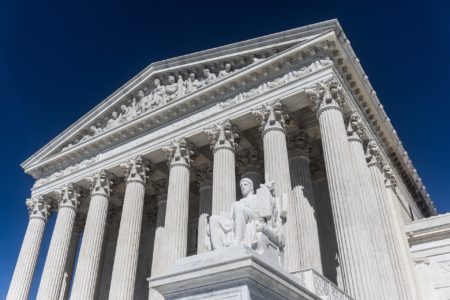
On Monday, the United States Supreme Court ruled that Title VII of the Civil Rights Act of 1964 prohibits employers from taking adverse employment actions based upon the sexual orientation or gender identity of an employee. See Bostock v. Clayton County, Ga., 2020 WL 3146686 (Jun. 15, 2020). The Bostock decision is a groundbreaking reversal of longstanding precedent in the Eleventh Circuit, which includes Alabama. In the past, gay and lesbian employees have enjoyed very limited employment rights, while transgender employees enjoyed some protection. Here is an old blog post providing a good overview of prior law for LGBTQ employees: Emerging LGBT Issues in the Workplace
The Bostock case was initially decided by the Eleventh Circuit Court of Appeals. Gerald Bostock worked as a child welfare advocate for Clayton County, Georgia. After a decade of working for the county, and winning numerous awards, he began participating in a gay recreational softball league. Shortly thereafter, community members made disparaging comments about Mr. Bostock’s sexual orientation and he was ultimately terminated for conduct “unbecoming” a county employee. Mr. Bostock sued, and lost, in the United States District Court for the Northern District of Georgia. On appeal, a panel of the Eleventh Circuit issued a one-page opinion upholding dismissal and adhering to longstanding precedent that “[d]ischarge for homosexuality is not prohibited by Title VII.” Bostock v. Clayton County Bd. of Comms., 723 Fed.Appx. 964 (2018) (quoting Blum v. Gulf Oil Corp., 597 F.2d 936, 938 (5th Cir. 1979).)
The Supreme Court reversed the Eleventh Circuit in a decision authored by Justice Neil Gorsuch. Title VII prohibits discrimination on the basis of “sex.” And, in the first paragraph of his opinion Justice Gorsuch concluded: “An employer who fires an individual for being homosexual or transgender fires that person for traits or actions it would not have questioned in members of a different sex. Sex necessarily plays a necessary and undisguisable role in the decision, exactly what Title VII forbids.”
Justice Samuel Alito, writing for a three-justice minority, argued that employers do not discriminate against LGBTQ employees on the basis of their “sex,” but on the basis of their conduct, which would not be prohibited by Title VII. According to Justice Alito, if an employer terminates both men and women for being gay, it draws no distinction on the basis of sex. But, Justice Gorsuch responded to that argument: “[I]t doesn’t matter if the employer treated women as a group the same when compared to men as a group. If the employer intentionally relies in part on an individual employee’s sex when deciding to discharge the employee — put differently, if changing the employee’s sex would have yielded a different choice by the employer — a statutory violation has occurred.”
While Bostock is a huge win for LGBTQ employees, it has not resolved all issues involving LGBTQ rights. After all, Justice Gorsuch is a conservative. Thus, he noted that employers with strong religious objections to LGBTQ employees might be protected by the Religious Freedom Restoration Act of 1993. In fact, Justice Gorsuch noted that “[b]ecause the RFRA operates as a kind of super statute, displacing the normal operation of other federal laws, it might supercede Title VII’s commands in appropriate cases.” But, because the RFRA was not before the Court, he made no express ruling on that issue. As a result, there is a strong likelihood that we will see further decisions involving employers like Hobby Lobby whose religious beliefs influence their business plans.
Justice Gorsuch also declined to say whether an employer violates Title VII by requiring sex-segregated bathrooms, locker rooms and dress codes. Instead, he expressly limited his opinion to a situation where an employer fires an individual merely for being gay or transgender.



